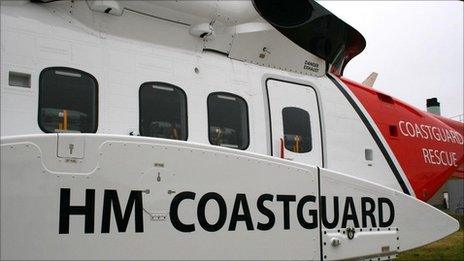Coastguard stations close: Operations and rescues remembered
- Published
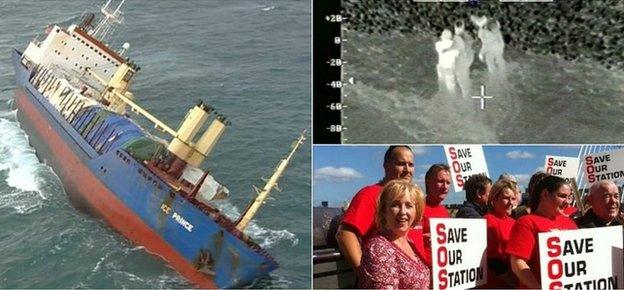
The Ice Prince cargo ship caught in gales, the attempted rescue of Chinese cockle pickers and the closure of some of the stations have all made headlines
Nine coastguard stations that have helped rescue those in trouble at sea are closing their doors under "modernisation" plans. BBC News looks back at some of their most significant rescues and operations.
From rescuing sailors off sinking cargo ships and fishing vessels, to investigating the initial reports following the Lockerbie bombing, coastguards have always played a prominent role.
The changes will see a national hub work alongside 10 smaller centres, which some fear will result in local knowledge being lost, although the government disputes this.
Mike Roberts, 74, who works at the soon-to-close Liverpool Coastguard Station, remembers the "whole horror" of the attempted rescue of 24 Chinese cockle pickers from Morecambe Bay in 2004.
The cocklers were working at night to send money back to their families, but were swept out to sea by the rising tide.

The cocklers were working to send money back to their families
A rescue operation began after one cockler, Guo Bing Long, called 999 and told police: "Sinking water, many many, sinking water... Sinking water, sinking water."
Mr Roberts said: "I came on watch first light after the event. There was a lot of confusion about the number of people involved and the situation. It was all a bit of a blur.
"As time past, it was then the whole horror of the situation began to emerge."
Twenty-three cockle pickers, aged between 18 and 45, had died and Mr Roberts said the sole survivor was "incredibly lucky".
"Our philosophy is to keep going until there is no hope. It was a very sad situation to be involved in, but you just had to get on with it."
The tragedy led to a huge investigation, court cases and changes to the law.
Gangmaster Lin Liang Ren was jailed for 14 years in 2006, external after being found guilty of manslaughter and helping the cockle pickers break immigration laws.
In a bid to prevent a similar disaster the Gangmasters Licensing Act was introduced., external
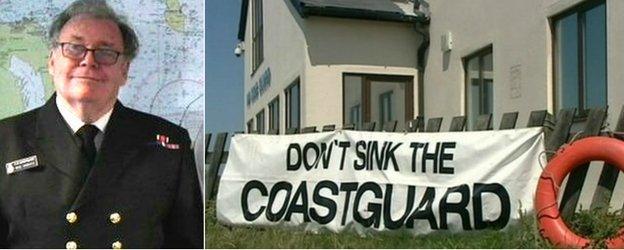
Mike Roberts works at Liverpool Coastguard Station, which closes later
During atrocious weather in January 2000 the station received a distress call from a scallop dredger off the Isle Of Man.
"The severe gale force winds and pretty horrendous conditions led to a phenomenally large air and sea search which lasted about 24 hours.
"We knew seven people were onboard, we had an accurate picture of where we were looking and we remained optimistic," said Mr Roberts.
On board the Solway Harvester were skipper Andrew Mills (known as Craig), 29, his brother Robin Mills, 33, their cousin David Mills, 17, Martin Milligan, 26, John Murphy, 22, David Lyons, 18, and Wesley Jolly, 17.
Mr Roberts said as time progressed and weather conditions worsened "in our heart of hearts it was the end of the story".
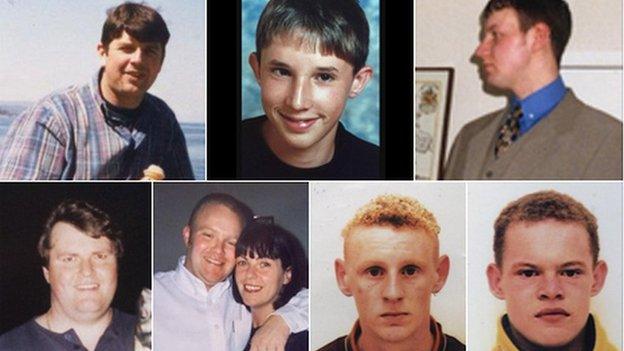
Skipper Andrew Mills (known as Craig), 29; his brother Robin Mills, 33; their cousin David Mills, 17; Martin Milligan, 26; John Murphy, 22; David Lyons, 18; and Wesley Jolly, 17; all died when the Solway Harvester sank
The men, who were all from the Isle of Whithorn area of Dumfries and Galloway, all drowned when the vessel sank.
Mr Roberts said: "It was tragic because they were all from the same area, so young, and were all known to each other.
"These poor people having to perish in such a vile way really tugged the heartstrings as the body count multiplied.
"It was a fraught day with a heavy media interest from around the world."
The Isle of Man government spent more than £1m to raise the vessel and retrieve the bodies.
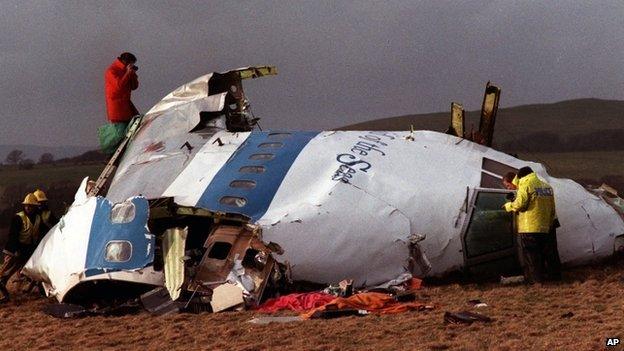
The debris from Pan Am flight 103 was scattered across 845 square miles
On 21 December 1988, Pan Am flight 103 exploded at 31,000ft over Lockerbie, in the south of Scotland.
Mr Roberts remembers numerous 999 calls initially reporting a red distress flare near Scotland's Solway Coast.
The station assigned coastguard teams from nearby Kirkcudbright and Port Ling to investigate the report as flares usually come from vessels.
However, Mr Roberts said the "horror became quickly apparent" it was actually a passenger plane that had exploded.
All 243 passengers, 16 crew and 11 people on the ground were killed.
The coastguard teams assisted at the scene and worked with other emergency services.
Mr Roberts said: "Once it was clear it wasn't a vessel our input was over, but we continued to watch the tragedy unfold in the media.
"From my point of view, the involvement was minimal but the event sadly memorable."
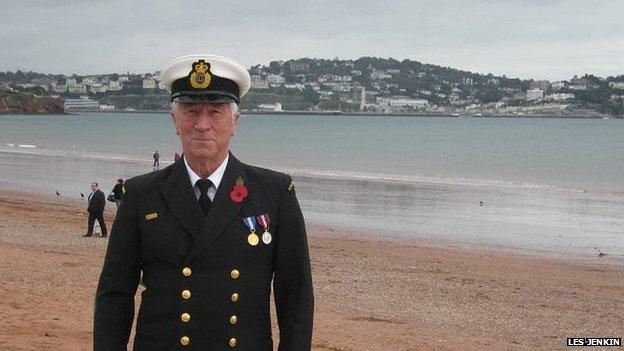
Les Jenkin worked as a coastguard watch assistant for 18 years
Six other coastguard stations have already closed under the restructuring, including Brixham, in Devon, which closed in October.
Les Jenkin, 62, who worked as a coastguard watch assistant for 18 years, said one of the most memorable jobs was the rescue of 20 crew from the stricken Ice Prince which was hit by severe gale force winds off the Devon-Dorset coast in 2008.
The gales shifted the ship's timber cargo, causing her to list 45 degrees and eventually sink off the south coast.
Twelve crew members were winched to safety, but conditions meant the remaining eight were forced to jump to safety off the badly-rolling cargo ship and on to the rescue boat.
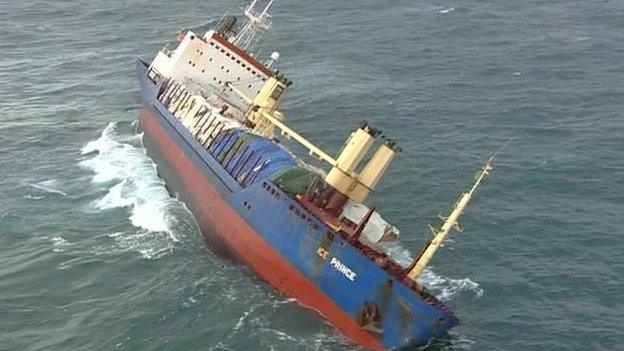
Dozens of attempts were made to rescue crew members on board the cargo ship Ice Prince
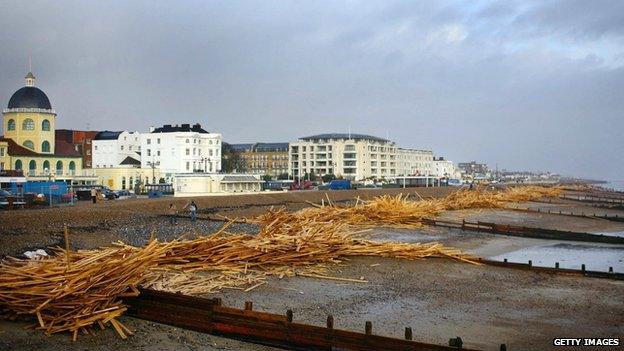
Wooden planks were strewn on Worthing seafront after the Ice Prince sank off the south coast
Mr Jenkin said: "The Torbay Lifeboat made 50 attempts to rescue the remaining crew members.
"It was a very difficult rescue, the weather conditions were horrendous and we were certainly concerned for their lives.
"There was always the fear the boat could sink or capsize."
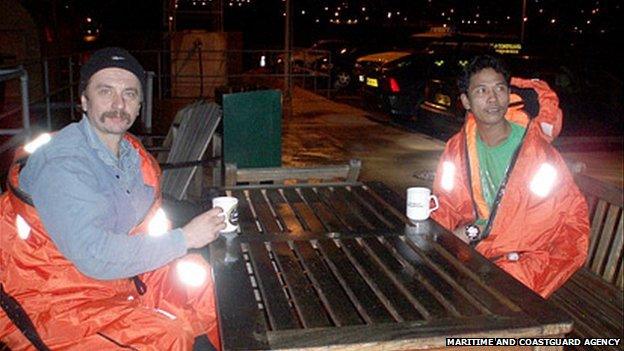
Twelve of the crew onboard the Ice Prince were airlifted by a coastguard helicopter and eight others were rescued by lifeboat
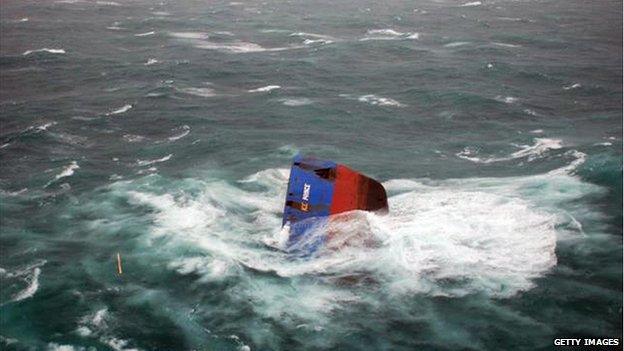
The Ice Prince sank about 26 miles (42km) off the coast after the storm
Mr Jenkin said one of the remaining eight crew members tried to board the lifeboat from the vessel but ended up in the sea before being rescued.
The Torbay Lifeboat crew received a Pride of Britain Award, external as a result.
Mr Jenkin also attended the funeral of fisherman and the husband of South East Cornwall MP Sheryll Murray, who died from multiple injuries in an accident on his boat off the Cornish coast in 2011.
"Three of us went to the funeral. Neil Murray would often call us and help with jobs if he was nearby so we felt we should go to his funeral," he said.
"He was like one of our own. If we had an incident we would put a call out to all fishing vessels and he would always respond.
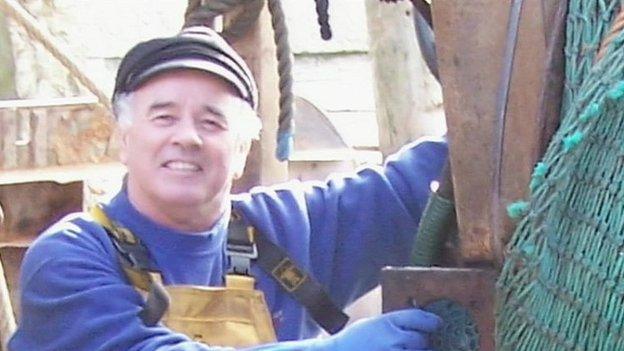
Neil Murray's vessel was located 25 miles (40km) south of Fowey, Cornwall
"I never met him in person, but there was a tremendous turnout at his funeral.
"It highlighted how important the job is and people do die and you have to cope with it."
Mr Jenkin, the vice chairman of the Brixham Coastguard PCS Union, said: "The union's stance was no stations should close.
"Local knowledge will be lost as calls will go to a national station hub.
"That will rely on computers and if they go down it could take longer to respond."
"I think the closure will have a knock on effect for the town. Fishermen used to come in and have a chat and a cup of tea and talk about their problems, now they can't," he added.

Changes to coastguard services
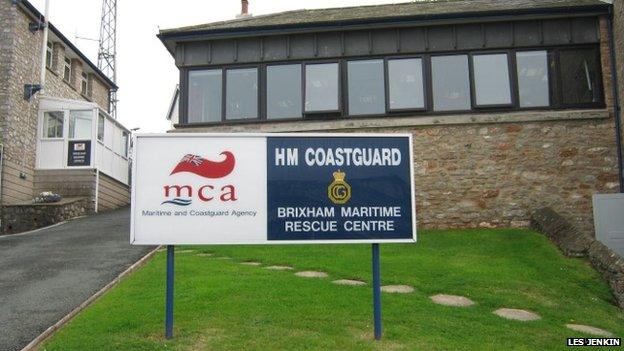
Brixham Coastguard closed in October 2014
Coastguard stations handle 999 calls, Mayday broadcasts and coordinate search and rescue operations around the coast.
The Maritime and Coastguard Agency plans to close nine coastguard stations between 2012 and 2015.
In 2014 it opened the national maritime operations centre in Hampshire which alongside 10 other centres will operate coastguard cover.
Under the plans, six coastguards have closed with a further three to go:
Forth Coastguard closed in September 2012
Clyde Coastguard closed in December 2012
Great Yarmouth Coastguard closed in May 2013
Solent Coastguard closed in September 2014
Portland Coastguard closed in September 2014
Brixham Coastguard closed in October 2014
Liverpool Coastguard closes in January 2015
Swansea Coastguard closes in March 2015
Thames Coastguard closes in June 2015
The MCA said that in a search and rescue operation there will be a much bigger and better support network available nationally to help coastguards dealing with multiple incidents, while maintaining local knowledge.
The organisation said the general public will not notice any difference and no compulsory redundancies have been made.

Along the south coast, Matthew West, 42, who used to work at Solent Coastguard Station before it closed in September, said one of his most memorable rescues was of a woman visible from his window.
"I took a 999 call from a woman on a speedboat sinking in the Solent. I was questioning her to establish her location, as it dawned on me that the building she was describing was in fact our ops room.
"I literally spun around in my chair and saw her clinging to the hull.
"We then scrambled the helicopter which was behind the building and watched it fly over and pluck the three occupants - a family of three to safety.
"I then got to meet them as they were brought ashore which was a great feeling, the only time it's ever happened."
- Published31 October 2014
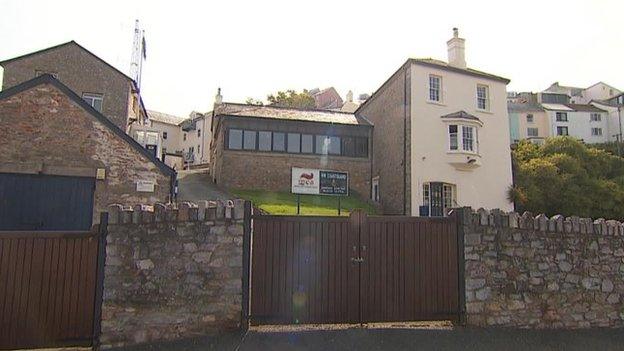
- Published21 December 2014
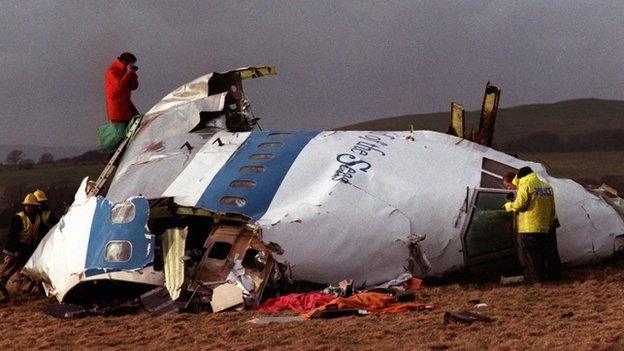
- Published3 February 2014
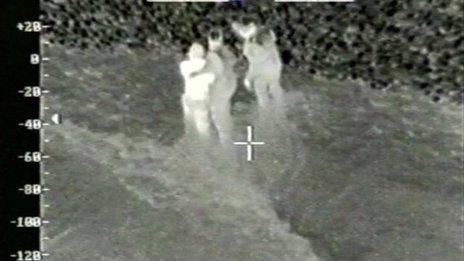
- Published8 November 2013
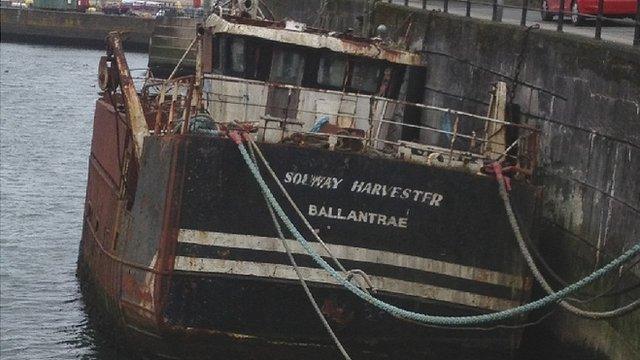
- Published10 February 2012
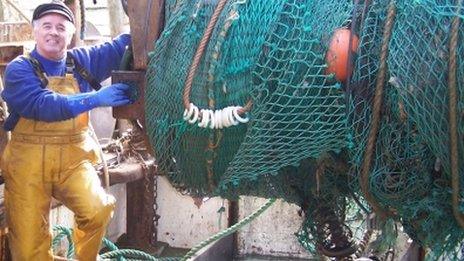
- Published23 June 2011
